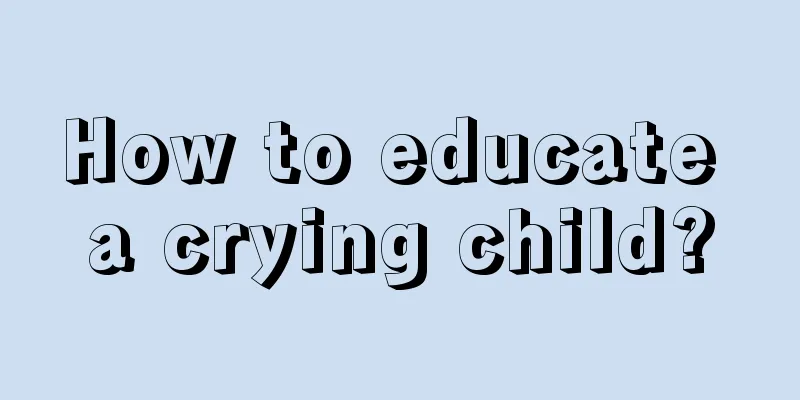How to train children's concentration?

|
In life, many children have varying degrees of inattention. In fact, this phenomenon is not necessarily the child's nature, and acquired training is also relatively important. If children develop a good habit of concentration, it will be very important for children in future work and study. If children do not have this habit of concentration, it will have a great impact on their study and work in the future. How to train children's concentration? Method 1 Let the children complete the learning tasks in stages within the specified time, changing the time to quantity Let the children complete the learning tasks in stages within the specified time, and change the time limit to a quantity limit. If the child can concentrate on completing the task, parents should give certain encouragement (praise, caress, kiss, etc.) and let him rest for 5-10 minutes. Complete the following study in the same way. When the child is able to do well, the time for concentrated question solving can be gradually extended. Ask your children to mark the requirements and conditions of the questions with a pen while reviewing the questions to prevent themselves from being distracted and making mistakes. These can all enhance the child’s self-confidence and make him feel that “I can consciously concentrate on doing one thing well.” Method 2 Encourage your child more often and don't interfere with him doing what he likes. Give more encouragement and don't interfere with your child when he is doing what he likes. When a child is so focused on making his little handicrafts or observing small animals that he forgets to eat, parents must remember not to disturb the child, but wait patiently for him to finish the work. You know, when a child is immersed in his interests, he is inadvertently developing his attention. Method 3 Try to reduce the number of nagging and scolding your child, so that the child feels that he is the master of his time. Try to reduce the number of times you nag and scold your child, so that your child feels that he is the master of his time. Teach your child how to allocate time. When he concentrates on doing his homework in a relatively short period of time, he will have more time to do other things. Children can control their own time, have a sense of success, and will be more confident in doing things. Method 4 "Reading aloud" helps train your attention Reading aloud helps train your concentration. Set aside a time every day (10-20 minutes) for children to choose their favorite short articles and read aloud to their parents. This is a process that coordinates children's mouth, eyes and brain. When children are reading, they should try their best not to make mistakes, miss words, or interrupt them. He must concentrate highly and keep up this training. Method 5 Create a home learning environment that is conducive to concentration Create a home learning environment that is conducive to concentration. Only books and other relevant learning supplies should be placed on the child’s desk. Toys and food should not be placed there; stationery should be simple. Children all like pencil cases with bright colors, exquisite patterns and diverse functions, but the functions should be as simple as possible. Pencils and erasers should also have simple shapes and single functions to prevent children from playing with them as toys. Children's study rooms should also be kept simple and neat, and childhood toys should be put away and not placed in conspicuous places. When children are studying, they should not be disturbed by sounds from televisions, telephones, etc. Parents should also try not to go in and out and disturb their children loudly when they are studying. In addition, indoor lighting is also an easily overlooked link. Soft and moderate light can help children concentrate and create a quiet and tidy environment for children. Method 6 Don't buy too many toys and books In daily life, don't buy too many toys and books for your children. We often see this situation: parents buy a lot of toys and books for their children, but the children often flip two pages of this book, then two pages of that book, and the same goes for the toys, playing with this for a while, then playing with that. Too many books and toys will only distract children. Method 7 Do one thing at a time Let children do only one thing at a time. Human attention resources are limited. Allocating them to things of different natures will seriously consume the effectiveness of attention. Especially when children's attention is in the process of development, doing multiple things at the same time will damage the effective concentration of attention. Therefore, even when children are playing with toys, turn off the TV; and do not play music when doing homework. Method 8 I have a promise with my child Play "self-discipline" games with your children and incorporate this approach into their lives. You can consciously set up some situations to help your child enhance his or her self-control ability under multiple stimuli and follow a step-by-step process. Method Nine Keep doing the necessary exercises, stick with it! Buy some books on intelligence training and practice them every day. Some pictures and texts to train observation, concentration and memory, such as walking through a maze, finding something in a pile of pictures, finding errors, finding similarities and differences (finding differences in similarities and similarities in differences), comparing size, length, etc. The time should not be too long, but you can extend the practice time later. You must practice every day. Red five-star rewards or scores can be given. Method 10 Staring Point Method & Schulte Grid The staring method can be used for training at any time, in the classroom or at home, just stare at a certain point or object for a few minutes every day. You can also use the Schulte training method, which is the most professional, popular and simple training method in the world. |
<<: Is Children's Throat Granule an anti-inflammatory drug?
>>: What to do if your child cries when entering kindergarten
Recommend
Symptoms of bile duct obstruction in babies
Babies are too young and sometimes cannot express...
The causes of otitis media in children are all ignored by everyone
Children's bodies are usually fragile and can...
The child does not speak clearly
The development process of each child is differen...
What to do if a five-year-old child has stomachache?
When a five-year-old child has a stomachache, mos...
How old can children take a hot spring bath?
Hot spring bathing has become a form of leisure a...
What to eat to improve children's memory
Many parents always complain that their children ...
What should I do if my child has lymph nodes?
Lymph nodes are very common in the human body and...
Can children eat American ginseng?
American ginseng is a relatively good nourishing ...
How to treat renal failure in children
Kidney failure in children is a relatively comple...
Why does the child feel pain under the eyes when squeezing his stomach?
Children often suffer from stomachaches, especial...
Causes and treatments of restless sleeping in babies
Babies will become insecure after leaving their m...
Why do newborn babies have yellow eyes?
The eyes are the windows to the soul, and childre...
Why does a boy grind his teeth when sleeping?
When you go to bed at night, especially when you ...
Benefits of bathing your baby
In daily life, people often take a bath to soothe...
Diagnosis of Myasthenia Gravis in Children
Myasthenia gravis in children is an extremely har...









